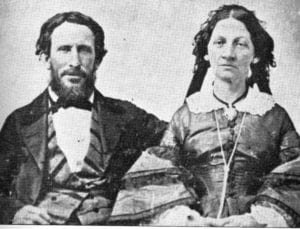James F. Reed was a prosperous merchant from Springfield, IL.
He was one of the founding members of a small wagon train that began their trek west in April 1846. He faithfully traveled with the party for the entire route—until they reached the eastern border of California, at the foot of the Sierra Nevada.
Unfortunately, leaders of the wagon train had followed the so-called “Hastings Cut-Off,” popularized by Lansford Hastings, a lawyer with political ambitions who never laid eyes on the path he prescribed for thousands. However, this “short cut” actually added 125 miles, a critical 30-to-40-day delay, and many torturous obstacles to the journey.
As the tormented travelers finally approached the California border, tempers were so volatile that a serious fight broke out between two of Reed’s friends, John Snyder and Milt Elliot. Reed tried to intervene, but Snyder attacked him with a bullwhip. As Reed tried to defend himself, he tragically stabbed and killed his friend.
The party banned Reed from the wagon train. Though they allowed his family to remain with the group, the band of travelers—now known as the Donner Party—wanted nothing to do with a killer.
Though rejected, James Reed remained deeply concerned for the group, especially for his family. Later, he proceeded on his own in hopes of reaching Fort Sutter in the Sacramento Valley and returning to the group with supplies.
Reed’s Venture

In late October 1846, Reed had made it over the treacherous Sierra Nevada and arrived at Fort Sutter. But the Donner Party was nowhere in sight and winter storms were already dumping heavy snows on the Sierra Nevada. Within two days of his arrival, Reed organized the first of several rescue teams to save his fellow travelers. But storms, deep snow, and the outbreak of war with Mexico frustrated his efforts.
Finally, in March 1847, Reed and a rescue team found the Donner Party. Although he had grave concerns for their welfare, Reed had no idea of the suffering and starvation the group had endured. As he feared they had been trapped at the summit of the mountains. Many starved or froze to death. Of the 87 members of the Donner Party, only 48 survived the winter—many by resorting to cannibalism. But among the wretched survivors were his wife and children.
Rejection to Redemption
Usually, any discussion of the Donner Party can be very disturbing. But the story has this bright aspect. The tragedy of the Donner Party is also a story of a man who turned rejection into redemption. James Reed, disowned by the people he had traveled with for so many miles, became the instrument of their salvation.
Immediately we can see the parallel to Christ, who died to save the sinful world which had rejected Him. But it also parallels the stories of other saints of old. Joseph, for instance, was rejected and sold as a slave by his brothers. But he turned that rejection into their salvation from starvation (Gen. 37–50). Moses also became the deliverer of those who had initially rejected his efforts to save them (Acts 7:35).
And the same story of turning rejection into rescue takes place again and again in the lives of those who follow Christ. The same Christ Who teaches us to love our enemies, to bless those who curse us, and to pray for those who persecute us (Matt. 5:43–45). We do this not to become doormats for the world to stomp on. We absorb the abuse and forgive again and again, in hope and faith that we might someday, by God’s grace and power, become the very instruments of their eternal salvation.
PRAYER:
Lord, make me an instrument of your peace;
Where there is hatred, let me sow love;
Where there is injury, pardon;
Where there is doubt, faith;
Where there is despair, hope;
Where there is darkness, light;
Where there is sadness, joy.
Divine Master, grant that I may not so much seek
To be consoled as to console;
To be understood as to understand;
To be loved as to love.
For it is in giving that we receive;
It is in pardoning that we are pardoned;
And it is in dying that we are born to eternal life. Amen.
In article photo: James and Margaret Reed by unknown (before 1862)





